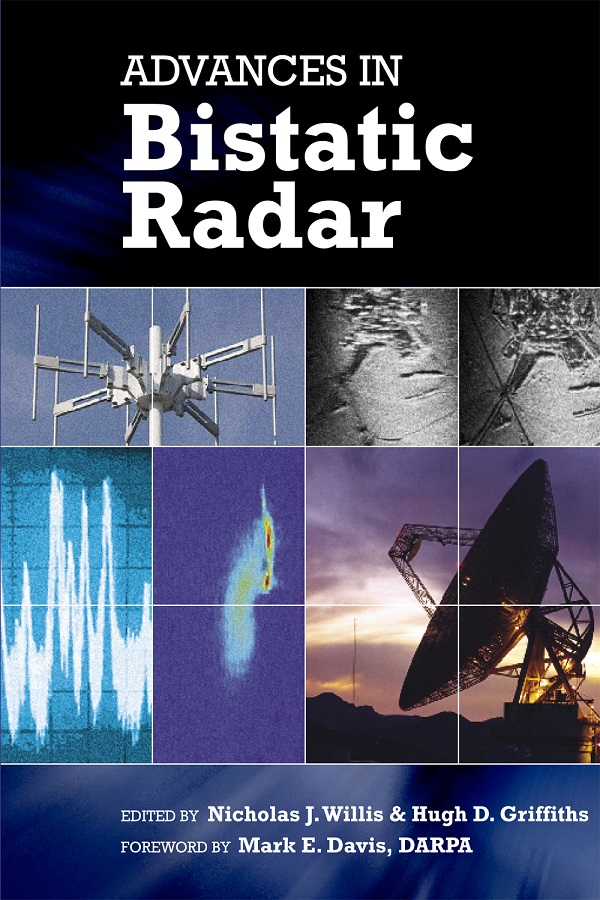- Agricultural Engineering and Technology
- Applied Physics
- Built Environment
- Computing and Networks
- Control, Robotics and Sensors
- Electrical Regulations
- Electromagnetics and Radar
- Energy Engineering
- Healthcare Technologies
- History and Management of Technology
- IET Codes and Guidance
- Manufacturing
- Materials, Circuits and Devices
- Model Forms
- Security
- Telecommunications
- Transportation

Advances in Bistatic Radar
Edited by Nicholas J. Willis, Hugh D. Griffiths
Advances in Bistatic Radar updates and extends bistatic and multistatic radar developments since the publication of Willis' Bistatic Radar in 1991. New and recently declassified military applications are documented, civil applications are detailed including commercial and scientific systems and leading radar engineers provide expertise to each of these applications. Advances in Bistatic Radar consists of two major sections: Bistatic/Multistatic Radar Systems and Bistatic Clutter and Signal Processing. Starting with a history update, the first section documents the early and now declassified military AN/FPS-23 Fluttar DEW-Line Gap-filler, and high frequency (HF) bistatic radars developed for missile attack warning. It then documents the recently developed passive bistatic and multistatic radars exploiting commercial broadcast transmitters for military and civilian air surveillance. Next, the section documents scientific bistatic radar systems for planetary exploration, which have exploited data link transmitters over the last forty years; ionospheric measurements, again exploiting commercial broadcast transmitters; and 3-D wind field measurements using a bistatic receiver hitchhiking off doppler weather radars. This last application has been commercialized. The second section starts by documenting the full, unclassified bistatic clutter scattering coefficient data base, along with the theory and analysis supporting its development. The section then details two major clutter-related developments, spotlight bistatic synthetic aperture radar (SAR), which can now generate high resolution images using bistatic autofocus and related techniques; and adaptive moving target indication (MTI), which allows cancellation of nonstationary clutter generated by moving (i.e. airborne) platforms through the use of bistatic space-time adaptive processing (STAP).
About the Editors
Nick Willis spent his entire career in the U.S. military industrial complex. He served in the U.S. Navy on destroyer duty and testing naval radars at White Sands Missile Range. He then worked on radars and electronic warfare with Philco-Ford, SRI International and Systems Control, Inc. In 1976 he rejoined the U.S. government at the Defense Advanced Research Projects Agency to work on stealth radars and vehicles. He rejoined industry for 17 years designing and evaluating radars at Technology Service Corp. and Westinghouse Electric Corp. Today, Mr. Willis consults for government and industry.
Hugh Griffiths received PhD and DSc(Eng) degrees from the University of London. From 1982-2006 he was with University College London. Since 2006 he has been Principal of the Defence College of Management and Technology, Cranfield University, which is part of the UK's Defence Academy. His research interests include radar and sonar systems, signal processing (particularly synthetic aperture radar and bistatic and multistatic radar), as well as antennas and antenna measurements. He has published over 300 papers and technical articles.
Hugh Griffiths has received numerous awards and he serves on the IEEE AESS Board of Governors, on the IEEE AESS Radar Systems Panel, and as Editor-in-Chief of IET Proceedings on Radar, Sonar and Navigation. He served as Chairman of the IEE International Radar Conference RADAR 2002 in Edinburgh, UK and he has advisory roles for the UK Ministry of Defence.
He is a Fellow of the IET and the IEEE and, in 1997, he was elected to Fellowship of the Royal Academy of Engineering.
Publication Year: 2007
Pages: 494
ISBN-13: 978-1-891121-48-7
Format: HBK
